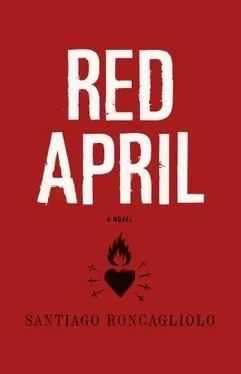“I don't like working with civilians too much, Señor Prosecutor. And let's be frank, in general you and I don't like each other much. But I'm very worried.”
“Well, Commander, I believe we could establish inter-institutional bridges of the greatest …”
“Chacaltana, let's get to the point.”
“Yes, Señor.”
“We'll work together but under my command.”
“Of course, Señor.”
They were silent for a period of time that seemed like years. Finally the commander said:
“All right, say something, damn it!”
The prosecutor tried to be calm. He wondered if he was feeling palpitations, or if perhaps everything around him was suffering from palpitations. He tried to confine himself to the case:
“I have written a report that I will send to you, Señor. I will tell you in advance that I would ask for a statement from those involved in this report, to wit, Lieutenant Alfredo Cáceres Salazar of the Army of Peru and the civilian Edwin Mayta Carazo, both of whom can shed useful light on the connection of the deceased to …”
“See them? Mayta and Cáceres? You want to see them?”
“See them … and speak with them, Señor.”
“Speaking with them will be difficult. As for seeing them, you already saw them. You met Edwin Mayta Carazo, at least a part of him, this morning when you looked into the grave. And you saw Lieutenant Cáceres Salazar thirty-eight days ago, when his burned body was found in Quinua.”
The prosecutor felt blocked by the information, passed over.
“Señor?” he stammered.
“Yes, it was that motherfucker Cáceres. He was reported missing in Jaén a month before his body was discovered.”
“Dog Cáceres?”
The commander gave a half smile, as if he were remembering an old comrade:
“They called him Dog, right? He was a shit of a man. A sinchi , a member of the counterinsurgency forces. They were kept rotting on a base in the jungle. Then they were transferred here to bring them up to date. Cáceres outdid himself in every interrogation. He made the entire grave you saw almost by himself. Edwin Mayta Carazo was caught in one of his operations. They began to ask him questions and he didn't cave in. Then he began to confess. He confessed to everything they asked but began to contradict himself on the second round of questions. His testimony didn't fit, his facts were impossible …”
“Perhaps because he did not know anything.”
“Or perhaps because he wanted to confuse us. Do you also think we can't tell a terrorist when we see one?”
The prosecutor drew back in his seat. The commander had turned red with anger but quickly regained his composure.
“I'm sorry,” he said. “For whatever reason, Cáceres went too far. As usual. I believe it was respiratory, I don't really remember. I suppose the lieutenant made up a report about his being released and declared him clandestine a few days later. The body was buried in a nearby garbage dump. But that wasn't enough. His mother went every morning to look for her son in the dump. The soldiers tried to keep her away, but at the first careless moment that damn old woman was digging through the garbage. When things became difficult, the bodies were pulled out and piled up in the grave you saw. From then on, whenever they find a grave somewhere, Edwin Mayta Carazo's mother shows up to look for his body. Though it doesn't appear in the press. I don't know how the fuck she finds out, but she's always there, trying to get close, dragged away by soldiers who can't shoot her, pawing through all the bodies. Very often the heads were … torn off the bodies to make them difficult to identify … but that woman could tell it wasn't her son, even though the body had been decomposing for months.”
“What happened to Lieutenant Cáceres … when things became difficult?”
“They gave him twenty years in the military prison in Lima. He served two years of his sentence and then was sent to the garrison at Jaén so nobody would see him. They gave him new documents. They ordered him not to exist.”
The prosecutor supposed that the orders had been rigorously carried out. Lieutenant Cáceres Salazar no longer existed. The prosecutor completed the sentence:
“Until he disappeared. He ran away from Jaén and came right here. Why?”
“I don't know, Chacaltana.” The commander poured himself another pisco . “But I can imagine. I've seen it before. People who have killed too much don't get better. Sometimes they have normal, peaceful years. But it's only a question of time before they blow up. Intelligence reported the presence of the lieutenant in Vilcashuamán three days before his death. They said he had established contact with the campesino patrols to organize a ‘defense against subversion.’ Imagine. Nobody paid attention to him. He had simply gone crazy.”
“Perhaps the terrorist groups in Yawarmayo found him and took their revenge.”
“Those people are controlled. They don't operate outside their area. But it seems there are others. You were right about the dates. But besides the ones you mentioned, it's the tenth anniversary of the death of Edwin Mayta and the end of the first harvest of the year 2000: ‘The blood harvest of the millenarian struggle,’ as they call it.”
“If they were terrorists, why did they also kill Justino Mayta?”
The commander looked up at one of the flags on the table. Then he looked at the prosecutor.
“I believe the reason for that is you, Señor Prosecutor.”
“What?”
“According to your report, you spoke to him, didn't you? The Senderistas usually killed those they suspected of being informers, their own people.”
“But he did not tell me anything important!”
“And how would they know that? It's understandable, I would have done the same thing, honestly.”
The prosecutor suddenly felt guilty of a death. It never would have occurred to him that one could be responsible for a death just like that, by default, without having done anything to produce it. Perhaps he was not the only one guilty. Perhaps there were more, in fact, perhaps he lived in a world where everyone was guilty of something.
“Why haven't you finished them off, Commander? Why are they still in Yawarmayo? The army could …”
“The army has orders not to do anything there. And the police have no resources. Lieutenant Aramayo has spent ten years asking for weapons and equipment. Lima won't give its approval.”
“They have to know what is going on …”
“Lima knows, Señor Prosecutor. They know everything and are everywhere. If for some reason they have to, they will go into Yawarmayo and massacre them. The operation will be on television. The press will be there.”
Everything was becoming tangled in the prosecutor's head. He felt exhausted by thinking. One cannot choose to see or not see, hear or not hear, one sees, one listens, one thinks, the thoughts refuse to leave one's head, they change, they dissolve, they become disturbed.
“Why … why are you telling me this, Commander?”
Again the commander showed that turbid smile, a mixture of irony and disillusion. Now he seemed to be in another world, wrapped in a blanket of memories.
“Do you know what Cáceres used to do when he found a terrorist in a village?” he said. “He would call together the entire village that had sheltered the terrorist, lay the accused down in the main square, and cut off an arm or a leg with a two-man saw. He often ordered his sinchis to do it, but sometimes he did it himself, with someone helping him. He did it while the terrorist was alive, so nobody in the village could avoid seeing him or hearing his screams. Then they would bury the separate parts of the body. And if the head was still complaining, they would give him the coup de grâce just before putting him in the ground, and then the campesinos were obliged to fill in the hole with dirt. Cáceres would say that with his system, that village would never be disobedient again.”
Читать дальше












